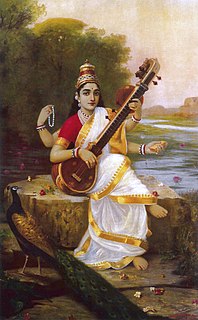Related Research Articles
Kalki, also called Kalkin, is the prophesied tenth avatar of the Hindu God Vishnu. His birth will be the end of the Kali Yuga, the final of the four eras, in the endless cycle of existence within Hinduism. This will subsequently start a new cycle with Satya Yuga.

Saraswati, also known as Sharada, is the Hindu goddess of knowledge, music, art, speech, wisdom, and learning. She is a part of the trinity (Tridevi) of Saraswati, Lakshmi, and Parvati. All the three forms help the trinity of Brahma, Vishnu, and Shiva to create, maintain, and regenerate the Universe, respectively.

Burton Dewitt Watson was an American scholar and translator known for his English translations of Chinese and Japanese literature. Watson's translations received many awards, including the Gold Medal Award of the Translation Center at Columbia University in 1979, the PEN Translation Prize in 1982 for his translation with Hiroaki Sato of From the Country of Eight Islands: An Anthology of Japanese Poetry, and again in 1995 for Selected Poems of Su Tung-p'o. In 2015, at age 88, Watson was awarded the PEN/Ralph Manheim Medal for Translation for his long and prolific translation career.

Abu'l Hasan Yamīn ud-Dīn Khusrau, better known as Amīr Khusrau Dehlavī, was a Sufi singer, poet and scholar who lived under the Delhi Sultanate. He was an iconic figure in the cultural history of the Indian subcontinent. He was a mystic and a spiritual disciple of Nizamuddin Auliya of Delhi, India. He wrote poetry primarily in Persian, but also in Hindavi. A vocabulary in verse, the Ḳhāliq Bārī, containing Arabic, Persian, and Hindavi terms is often attributed to him. Khusrau is sometimes referred to as the "voice of India" or "Parrot of India" (Tuti-e-Hind), and has been called the "father of Urdu literature."

Ko Un is a South Korean poet whose works have been translated and published in more than fifteen countries. He had been imprisoned many times due to his role in the campaign for Korean democracy and was later mentioned in Korea as one of the front runners for the Nobel Prize in Literature.
—From Robert Frost's "Stopping by Woods on a Snowy Evening", first published this year in his collection New Hampshire
Nationality words link to articles with information on the nation's poetry or literature.
Nationality words link to articles with information on the nation's poetry or literature.
Nationality words link to articles with information on the nation's poetry or literature.
Nationality words link to articles with information on the nation's poetry or literature.
Nationality words link to articles with information on the nation's poetry or literature.
Nationality words link to articles with information on the nation's poetry or literature.
Nationality words link to articles with information on the nation's poetry or literature.
Nationality words link to articles with information on the nation's poetry or literature.
Nationality words link to articles with information on the nation's poetry or literature.
Nationality words link to articles with information on the nation's poetry or literature.
Nationality words link to articles with information on the nation's poetry or literature.
In the lineal kinship system used in the English-speaking world, a niece or nephew is a child of the subject's sibling or sibling-in-law. The converse relationship, the relationship from the niece or nephew's perspective, is that of an aunt or uncle. A niece is female, while a nephew is male, with the term nibling used in place of the gender specific niece and nephew in some specialist literature.
Nationality words link to articles with information on the nation's poetry or literature.
Nationality words link to articles with information on the nation's poetry or literature.
References
- ↑ González, N.V.M. (2008). Mindoro and Beyond: Twenty-one Stories. UP Press. p. 243. ISBN 9789715425674 . Retrieved August 10, 2016– via Google Books.
- ↑ Smyth, David (2000). The Canon in Southeast Asian Literatures. Psychology Press. p. 52. ISBN 9780700710904 . Retrieved August 10, 2016– via Google Books.
- ↑ Herbert, Patricia (1989). South-East Asia: Languages and Literatures: a Select Guide. University of Hawaii Press. p. 160. ISBN 9780824812676 . Retrieved August 10, 2016– via Google Books.
| This article related to a poem is a stub. You can help Wikipedia by expanding it. |
| This Philippines-related article is a stub. You can help Wikipedia by expanding it. |